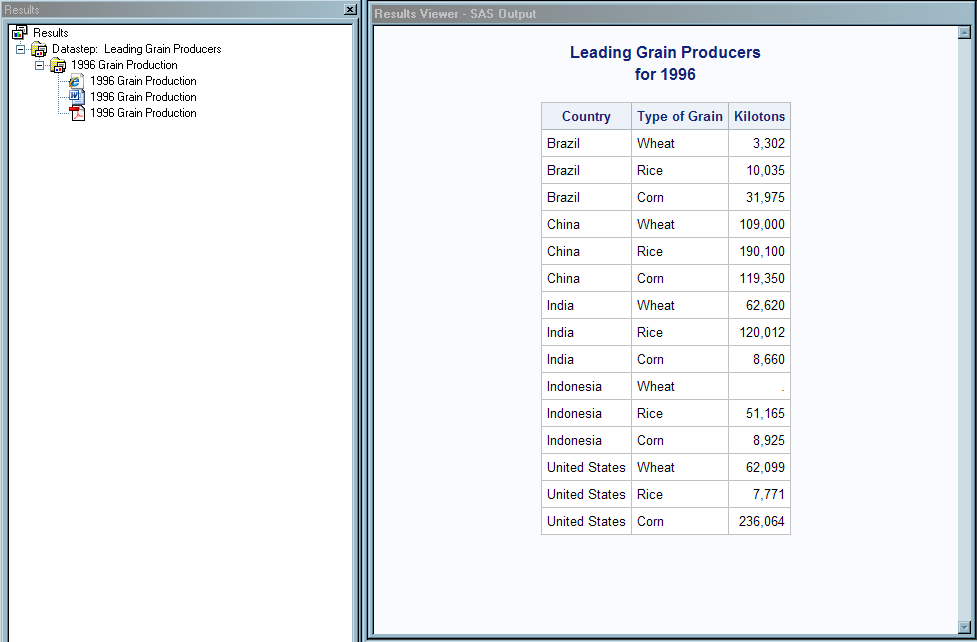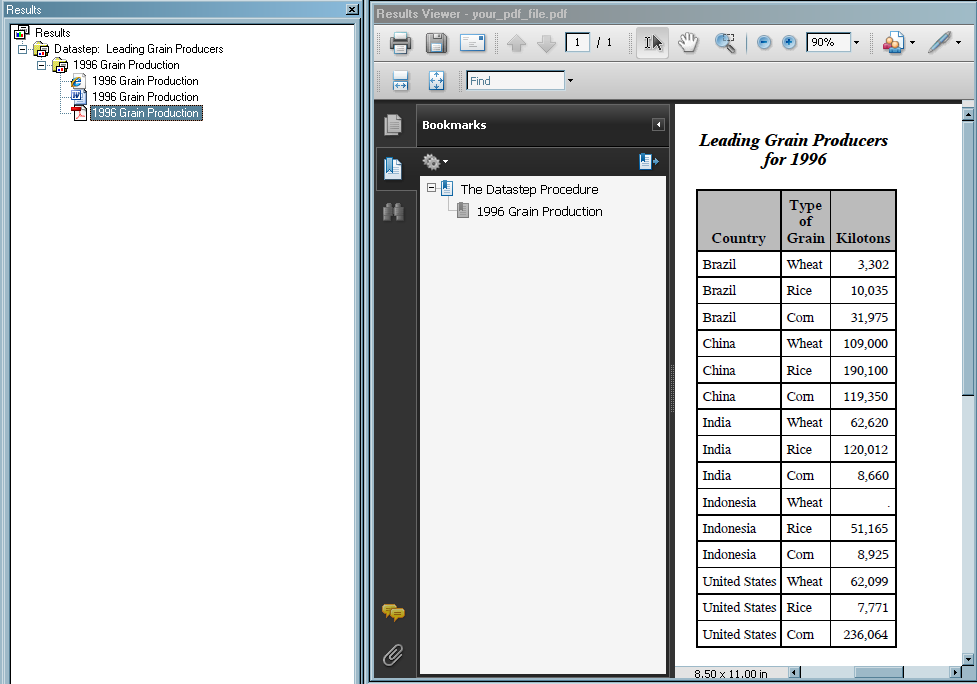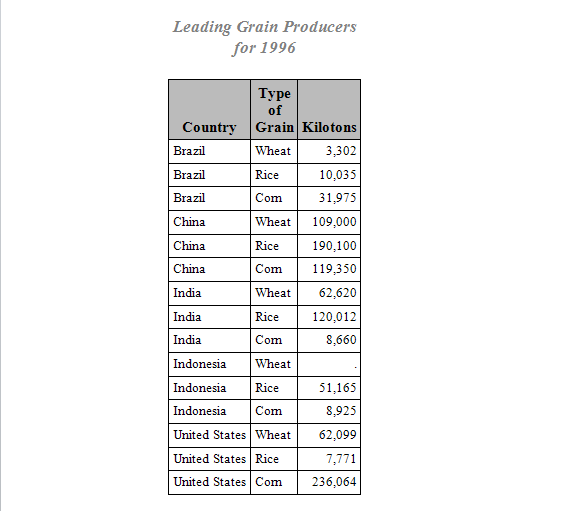Example 3: Assigning Attributes to Columns in ODS Output
| Features: |
PUT _ODS_ statement |
| Format: | $CNTRY. |
| ODS destinations: | HTML
RTF PRINTER (PDF) |
Details
This example assigns
a label to the output object that it creates. It also specifies a
label and a format for individual columns. This example uses filenames
that might not be valid in all operating environments. To successfully
run the example in your operating environment, you might need to change
the file specifications. See ODS HTML Statements for Running Examples in Different Operating Environments.
Program
options pagesize=60 linesize=64 nodate pageno=1;
ods html body='your_body_file.html' contents='your_contents_file.html' frame='your_frame_file.html';
ods printer
file='your_postscript_file.ps';
title 'Leading Grain Producers'; title2 'for 1996';
data _null_;
length Country $ 3 Type $ 5; format country $cntry.; label type='Grain';
input Year country $ type $ Kilotons; if year=1996;
file print ods= (objectlabel='1996 Grain Production'
variables=(country
type(label='Type of Grain')
kilotons(format=comma12.))
);
put _ods_;
datalines; 1995 BRZ Wheat 1516 1995 BRZ Rice 11236 1995 BRZ Corn 36276 1995 CHN Wheat 102207 1995 CHN Rice 185226 1995 CHN Corn 112331 1995 IND Wheat 63007 1995 IND Rice 122372 1995 IND Corn 9800 1995 INS Wheat . 1995 INS Rice 49860 1995 INS Corn 8223 1995 USA Wheat 59494 1995 USA Rice 7888 1995 USA Corn 187300 1996 BRZ Wheat 3302 1996 BRZ Rice 10035 1996 BRZ Corn 31975 1996 CHN Wheat 109000 1996 CHN Rice 190100 1996 CHN Corn 119350 1996 IND Wheat 62620 1996 IND Rice 120012 1996 IND Corn 8660 1996 INS Wheat . 1996 INS Rice 51165 1996 INS Corn 8925 1996 USA Wheat 62099 1996 USA Rice 7771 1996 USA Corn 236064 ; run;
ods _all_ close;
Program Description
Set the SAS system options. The NODATE option suppresses the display of the date and time in
the output. The PAGENO= option specifies the starting page number.
The LINESIZE= option specifies the output line length, and the PAGESIZE=
option specifies the number of lines on an output page. These options
affect the LISTING output, but none of them affects the HTML output.
Specify that you want to create HTML output. Also specify
where to store the HTML output: the body file, the contents file,
and the frame file. The ODS HTML statement
opens the HTML destination and creates HTML output. The BODY= option
identifies the file that contains the HTML output. The CONTENTS= option
identifies the file that contains a table of contents to the HTML
output. The contents file links to the body file. The FRAME= option
identifies the file that integrates the table of contents, the page
contents, and the body file. If you open the frame file, you see a
table of contents, a table of pages, or both, as well as the body
file.
ods html body='your_body_file.html' contents='your_contents_file.html' frame='your_frame_file.html';
Specify that you want PostScript output. Also specify
where to store the PostScript output. The ODS PRINTER statement opens the PRINTER destination and creates
PostScript output by default. The FILE= option sends all output objects
to the external file in the current directory.
Begin a DATA step that does not create an output data
set.Using _NULL_ saves computer resources
because it prevents the DATA step from creating an output data set.
Assign lengths other than the default to two character
variables. Also assign a user-defined format to one variable and a
label to another. The LENGTH statement
assigns lengths to COUNTRY and TYPE. The FORMAT statement assigns
a format to the variable COUNTRY. The LABEL statement assigns a label
to the variable TYPE.
Read a record from the input data, assign values to four
variables. Continue to process only observations that match the criterion. The INPUT statement reads a single record and assigns
values to four variables. The subsetting IF statement causes the DATA
step to continue to process only those observations that contain the
value 1996 for YEAR.
Send the DATA step output to the open destinations, specify
a label for the output object, and specify the variables to write
to the data component and the order in which to write them. The combination of the fileref PRINT and the ODS
option in the FILE statement sends the results of the DATA step to
ODS. The LISTING, the HTML, and the PRINTER destinations are open.
Because no table definition is specified, ODS uses the default DATA
step definition. The OBJECTLABEL= suboption specifies the label '1996
Grain Production' to the output object. This label appears in the
Results folder and in the HTML contents file. The VARIABLES= suboption
specifies the variables to write to the data component and the order
in which to write them. The LABEL= suboption specifies a label for
the variable TYPE. The label specified here takes precedence over
the LABEL statement assignment that was made previously in the DATA
step, so it is used as the column heading for TYPE. The FORMAT= suboption
assigns a format for the variable KILOTONS.
file print ods= (objectlabel='1996 Grain Production'
variables=(country
type(label='Type of Grain')
kilotons(format=comma12.))
);Write the variables to the buffer. The _ODS_ option in the PUT statement writes all
of the variables that are defined to ODS (in the FILE PRINT ODS statement)
to a special buffer. It uses default attributes for COUNTRY, and it
uses any attributes specified in the VARIABLES= suboption for the
other variables. For attributes that might be specified elsewhere
in the DATA step but are not specified in VARIABLES=, it uses the
defaults.
The data provides information about the amounts of wheat,
rice, and corn that five leading grain-producing nations produced
during 1995 and 1996.
datalines; 1995 BRZ Wheat 1516 1995 BRZ Rice 11236 1995 BRZ Corn 36276 1995 CHN Wheat 102207 1995 CHN Rice 185226 1995 CHN Corn 112331 1995 IND Wheat 63007 1995 IND Rice 122372 1995 IND Corn 9800 1995 INS Wheat . 1995 INS Rice 49860 1995 INS Corn 8223 1995 USA Wheat 59494 1995 USA Rice 7888 1995 USA Corn 187300 1996 BRZ Wheat 3302 1996 BRZ Rice 10035 1996 BRZ Corn 31975 1996 CHN Wheat 109000 1996 CHN Rice 190100 1996 CHN Corn 119350 1996 IND Wheat 62620 1996 IND Rice 120012 1996 IND Corn 8660 1996 INS Wheat . 1996 INS Rice 51165 1996 INS Corn 8925 1996 USA Wheat 62099 1996 USA Rice 7771 1996 USA Corn 236064 ; run;
To view the HTML output and print the PostScript output,
close both the HTML and PRINTER destinations. This statement closes the LISTING, HTML, and PRINTER
destinations and all the files that are associated with them. You
must close the HTML destination before you can view the output with
a browser. You must close the PRINTER destination before you can
print the output on a physical printer. If you do not close these
destinations, then output created in subsequent sessions will be routed
to them, and you might inadvertently continue to generate both HTML
and PostScript output.
Output
In this HTML frame
file, the object's label, '1996 Grain Production' was supplied by
the OBJECTLABEL= suboption. It appears in the table of contents as
the link to the output object. In the body file, the label 'Type of
Grain' that was supplied by the LABEL= suboption for the variable
TYPE becomes its column heading. The format for KILOTONS was supplied
by the FORMAT= suboption in the FILE statement.
HTML Frame File Produced by ODS


